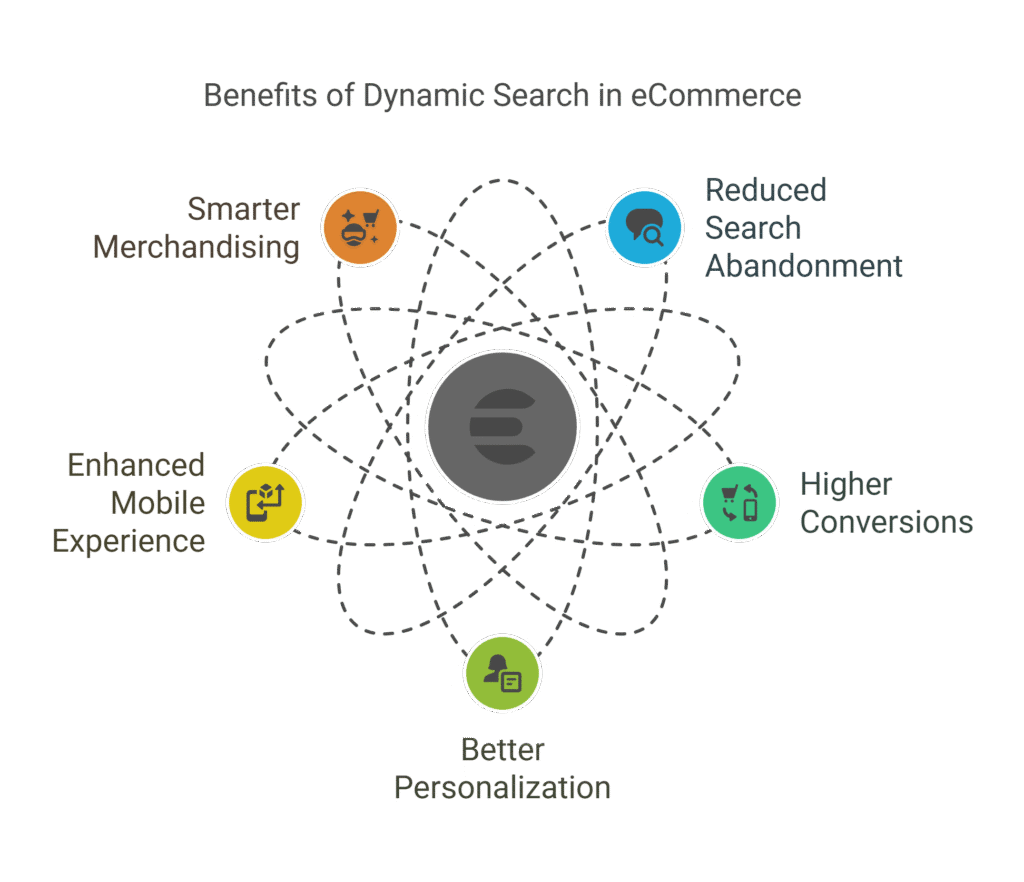In today’s eCommerce landscape, speed isn’t a luxury—it’s a conversion tool. Dynamic search, also known as real-time or live search, is a game-changing feature that updates results as users type. Gone are the days of static search boxes and clunky page reloads. Today, the savviest brands use dynamic search to keep users engaged, reduce friction, and guide them seamlessly to what they want.
This blog unpacks what this adaptive search experience is, how it works, and why it’s critical to the success of modern online stores.
What Is Dynamic Search?
Dynamic search refers to a system that updates product results, suggestions, and filters instantly based on the user’s input—without needing to reload the page.
It combines autocomplete, instant indexing, and predictive algorithms to refine results in real time. This technology is common in top-tier eCommerce platforms like Amazon, Zalando, and Shopify Plus stores, where milliseconds count.
Key Benefits of Dynamic Search for eCommerce

1. Reduced Search Abandonment
Static search often leads to frustration and dead ends. This adaptive search experience keeps the experience fluid, surfacing options immediately as customers type.
2. Higher Conversions
Faster, smarter results mean shoppers find what they want quicker. That reduces bounce rates and drives checkout completions.
3. Better Personalization
Dynamic search engines can learn from user behavior. They prioritize relevant results based on browsing history, preferences, and even device type.
4. Enhanced Mobile Experience
Typing on mobile is clumsy. This adaptive search experience cuts keystrokes and auto-completes queries, improving UX dramatically.
5. Smarter Merchandising
Retailers can push featured products, seasonal items, or promotions right into the live search dropdown, turning search into a sales channel.
How It Works Behind the Scenes
Dynamic search typically relies on:
- Front-end JavaScript frameworks to update results live.
- Search indexing engines (like ElasticSearch, Algolia, or Expertrec) to serve fast, filtered data.
- Behavioral analytics to refine future predictions.
All of this needs to be tied to a structured catalog where custom fields and tags are properly indexed.
Use Cases That Win Customers
- Fashion Retailers: Suggest styles by keyword, color, or brand in real time.
- Grocery eCommerce: Autocomplete ingredients, diet tags, or brands.
- B2B Stores: Narrow SKUs by part number, material, or compatibility instantly.
- Marketplace Models: Let vendors push live inventory or offers based on user input.
Is There a Top Choice for Dynamic Search ?
Yes, Expertrec’s search platform offers real-time indexing, custom ranking, and lightning-fast response—all without developer bottlenecks. Here’s how it stands out:
- Indexes every custom field you need.
- Enables dynamic filters and smart autocomplete.
- No-code configuration and seamless integration.
- Personalization options and analytics built in.
If you want to deliver Amazon-like search without building from scratch, Expertrec gives your store that edge.
Conclusion
Dynamic search is more than a UX upgrade—it’s a sales engine. From boosting conversions to reducing friction and enhancing mobile shopping, it’s essential tech for modern eCommerce.
By pairing a well-structured product catalog with a robust solution like Expertrec, you don’t just show products faster—you show the right products, to the right people, at the right time.
Frequently Asked Questions
1. What’s the difference between dynamic search and traditional site search?
This adaptive search experience updates results as you type; traditional search requires full query submission and a page reload.
2. Does dynamic search impact site speed?
Yes—in a good way. It makes the user experience faster, provided your backend can handle real-time indexing and queries.
3. Can I control which products show up first in dynamic search?
Yes. Tools like Expertrec let you boost results based on popularity, margins, or campaigns.
4. Is it hard to implement on Shopify or WooCommerce?
Not at all. Plenty of apps and plugins offer turnkey integrations.
5. Will dynamic search work with my product filters?
Absolutely. You can dynamically filter by size, brand, price, or any custom field you define.




